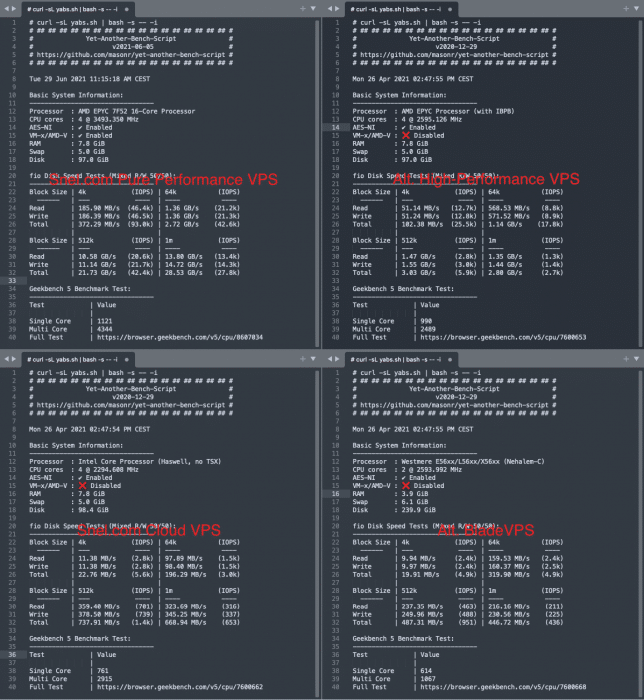Year: 2016
When designing our Cloud VPS platform, we kept redundancy, scalability and, speed in mind in order of importance.
In these choices, 2 things appear to be mutually exclusive:
If you choose distributed storage, your disk performance suffers.
If you choose a lot of CPU cores, your CPU performance suffers.
Year: 2019
During a team meeting, we first discussed an additional VPS platform in addition to our Cloud VPS platform.
Goal: Performance. Full stop.
Important: No concessions
Year: 2021
We are about to launch our new platform.
Choices made:
Local NVMe in RAID 10
High CPU clock speed
We have received an invitation from one of our competitors. They have asked us to participate in a beta test of their high-performance VPS platform. Of course, we will. No problem.
Setup
We have tried to allocate the same resources on both the platform of our competitors and on our own platform to keep the test as fair as possible. For the performance VPS's, we have used a bare Debian 10 installation, regular VPS's and we used existing VPS's. This explains why there are some differences in the configuration.
Benchmarking
We have run many benchmarks with nench in the past. Because we encountered some shortcomings, we have made a for under the name snench.sh
(https://git.snel.com/snelcom/snench).
We shared our initial tests with our competitors. In consultation with them, we nevertheless concluded that the IOPS test is not entirely correct.
We ended up redoing our tests with Yet-Another-Bench-Script (https://github.com/masonr/yet-another-bench-script). We also shared these results with our colleagues and concluded together that these result are a better reflection of the actual performance.
In the results we have omitted the speedtest results as they add nothing to our current test. The exact command for running these benchmarks is:
curl -sL yabs.sh | bash -s -- -i
Disclaimer
Please note that this is a snapshot. We ran the tests several times and the results were similar.
Resultaten

What strikes us
If we look at Snel.com's offer and compare the Pure Performance VPS with the Cloud VPS, we see:
Much better CPU performance (+)
Much faster speeds on the discs in all tests (+)
If we look at the offer of our competitors ( High-Performance VPS vs BladeVPS), we see the same thing.
In other words: The Pure Performance VPS and the High-Performance VPS offer more performance than the regular VPS servers from the same suppliers. This result is not shocking.
If we compare Snel.com's offer with our competitors, we see that the difference is quite large in favor of Snel.com on both the CPU and the disks. In certain tests, there is even a difference of a factor of 10 in the disk performance.
Inquiries with our colleagues tell us that they have opted for a storage solution with Ceph. Although we emphasize its advantages (we also use Ceph for our CloudVPS products), we have consciously opted for local disks without a network layer with the Pure Performance VPS.
Remember what we said “no concessions”.

